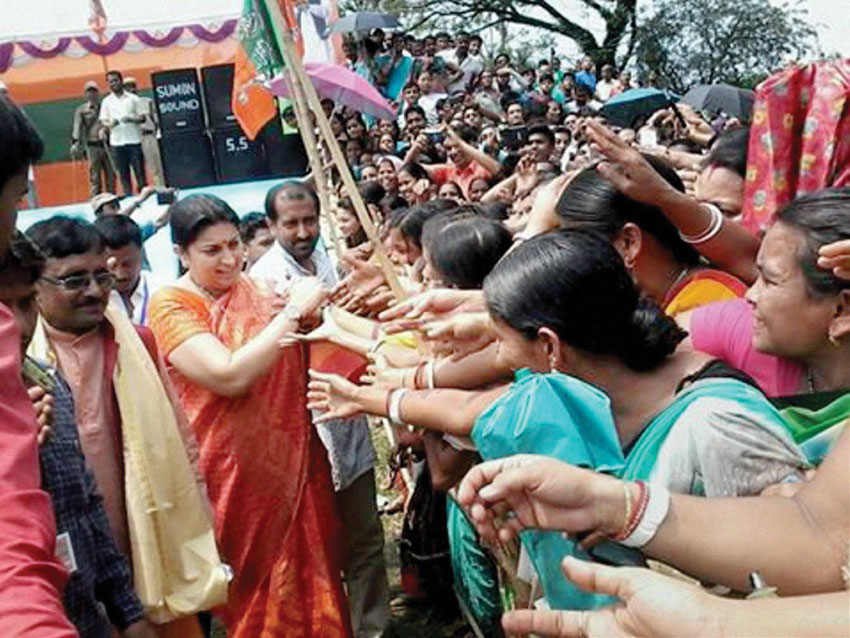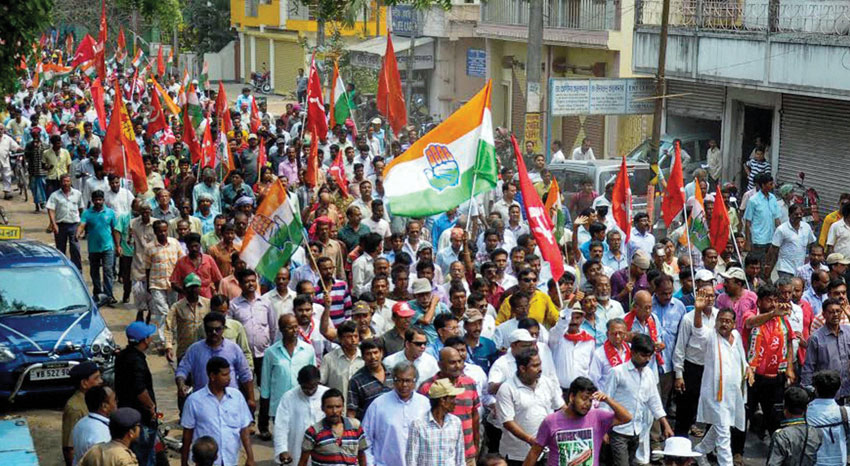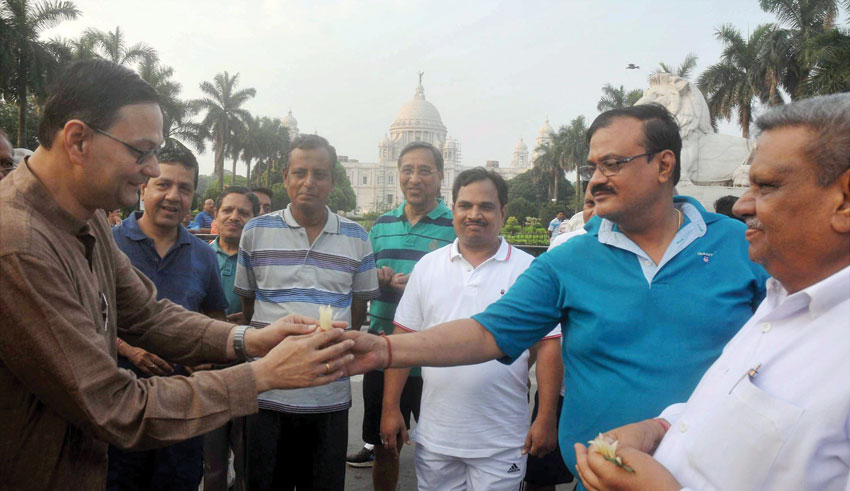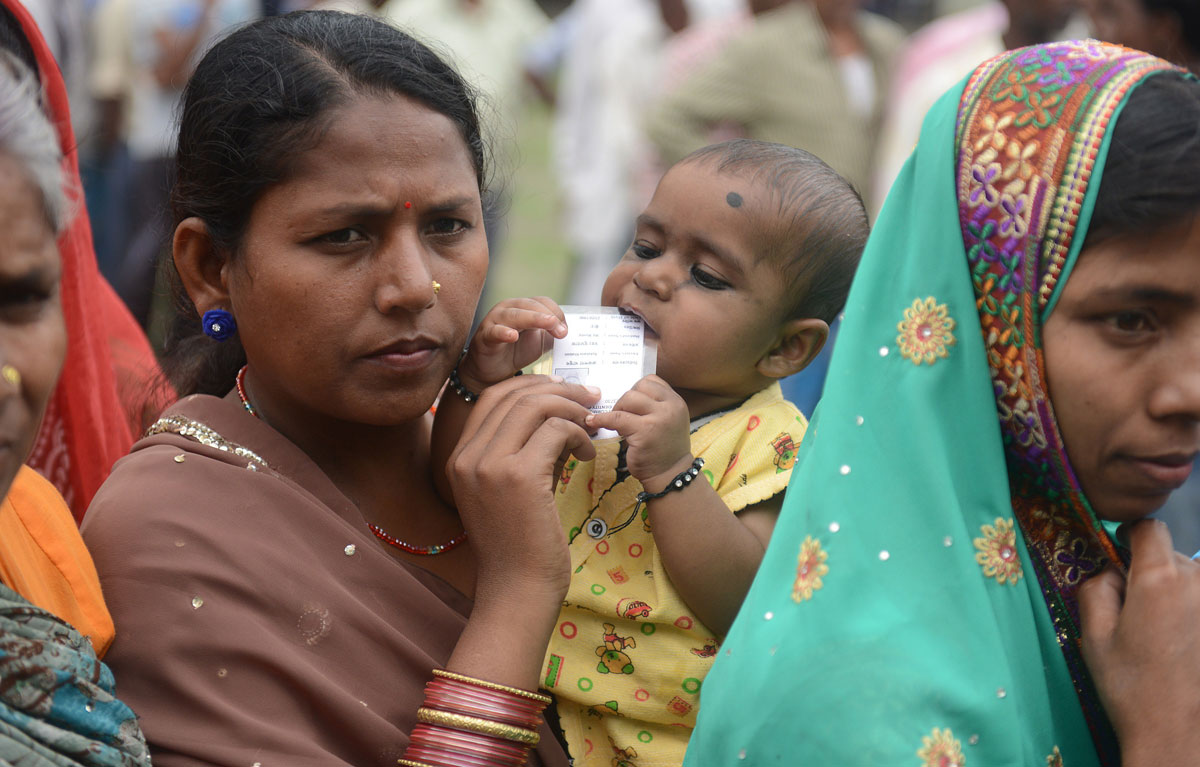4 STATES & A UNION TERRITORY
File photo of a child playing with his mother’s voter identity card as voters wait in a queue to cast their votes at a polling station in Siliguri, West Bengal, on April 25, 2015. Residents of the eastern city were casting their vote for elections of the Siliguri Municipal Corporation. (Diptendu Dutta | AFP | Getty Images)
The Election Commission of India has announced that four states, namely Tamil Nadu, West Bengal, Kerala and Assam, and Puducherry, a Union Territory, will go for assembly elections in April 2016. On May 19 the fate of governments will be decided after a single phase of elections in Tamil Nadu, Kerala and Puducherry, six phases in West Bengal and two phases in Assam, writes Priyanka Bhardwaj. (@siliconeer, #siliconeer, #india, #indiastateassemblyelections)
Nasim Zaidi, the Chief Election Commissioner declared immediate implementation of model code of conduct in all concerned states and earmarked May 21 as the date of completion of the election process.
All women polling stations will feature in these elections as well as display of candidates’ photographs to prevent confusion over namesakes, a symbol for the NOTA (none of the above) option and deployment of central paramilitary forces.
West Bengal: About 65.5 million people are expected to cast their votes in the six-phase polls that will commence on April 4 and conclude on May 5.
The ruling Trinamool Congress has decided to go alone in the polls and the party supremo Mamata Banerjee has already announced the list of candidates, including 45 women and 57 Muslims, for all 294 assembly seats.

A few incumbents have been dropped but surprisingly Madan Mitra, former transport minister and accused in the Saradha ponzi scam, has been re-nominated to contest from his old constituency Kamarhati in North 24 Parganas district.
Others candidates are former Bengal cricket captain Lakshmi Ratan Shukla; daughter of former BCCI (cricket board) president Jagmohan Dalmiya, Vaishali Dalmiya; Bengali film star Sohom; former Indian football captain Baichung Bhutia and footballer Rahim Nabi.
Even as the Congress and Bharatiya Janata Party are not expected to win the mandate they are putting up a bold front to increase their space by raising the issue of graft and corruption.
The Congress has called for an all-party alliance against the ruling TMC and its unofficial alliance with the Left might win them some sizeable share of minority votes.
On the other hand the BJP may be unable to garner much on account of their “nationalist plank” which is considered communal and unpalatable to non-Hindus but are banking on coalescing the Hindus and the poor governance of TMC in the state.
The ECI has sought a report on seizure of arms, ammunition and fake currency in certain districts.

Assam: The frontier state with 19.8 million eligible voters will see the two-phase elections on April 4 and April 11.
The main contenders in the political tussle for the 126 member assembly will be the Congress and BJP though it is uncertain if any party will get the complete majority to form the government.
In the last polls the Congress led by Chief Minister, Tarun Gogoi, was the frontrunner, followed by the Badruddin Ajmal’s All India United Democratic Front, while the BJP was relegated to the margins.
This time Gogoi’s Congress is expected to face ant-incumbency as he is supposed to have irked both the Bangladeshi immigrants due to his communal image and Bengali Hindus for favoring Muslims. The saffron party (BJP) is seen promising permanent sealing of the Indo-Bangladeshi border to stop infiltration if it wins the election.
If the BJP and its coalition partners, Asom Gana Parishad and Bodoland People’s Front are unable to form the government, going by some predictions, then the pro-Muslim outfit, AIUDF could emerge as the kingmaker.
The verdict is most likely to be considered a litmus test of the virility of Narendra Modi’s appeal to manage an assembly harvest for the BJP for the first time in this state.
Tamil Nadu: In a single phase election on May 16, 58 million voters will exercise their franchise in this southernmost state.
Broadly speaking there are three sets of fronts contesting the state elections: the Jayalalithaa-led All India Anna Dravida Munnetra Kazhagam, the incumbent party; the Dravida Munnetra Kazhagam with the Congress and an assortment of smaller entities; and the latest left-wing cobbled together by popular actor-turned-politician, Vijayakanth’s (also called “Captain”) Desiya Murpokku Dravida Kazhagam.
Local parties such as the Pattali Makkal Katchi would be making the foray alone.
In 2011 assembly elections AIADMK had won 30 of the 124 seats and DMK had garnered 23 seats.
In the movie-star besotted state the current scenario is best suited to AIADMK and if not so then the third front may be a decisive power to reckon with as the DMDK has been winning a stable share since 2006.
At the time of filing this story the Congress and DMK Chief M. Karunanidhi were discussing issues of seat sharing and chalking out the strategy for the polls.
Leading the Congress camp are senior leaders, Ghulam Nabi Azad, Mukul Wasnik, E.V.K.S. Elangovan and Gopinath and the DMK participants are party chief Karuanidhi, M.K. Stalin, party Rajya Sabha MP Kanimozhi, senior leaders Duraimurugan, and E.V. Velu.
While it is rumored that the Congress is aiming for 45 seats in a more realistic way, DMK is said to have offered just about 25.
In the 2011 elections, Congress had contested 63 seats in alliance with DMK but had won just 5.
The DMK has already allocated five seats to Manithaneya Makkal Katchi and IUML each.
As for the BJP, it is widely known that it would more than satisfied if it reaches an alliance with anyone in this Dravidian state.
In 2014 Lok Sabh polls it had managed to win just one seat despite aligning with Jayalalitha’s AIADMK and hence it is being shunned by one and all.

Kerala: For the 140 seat assembly, 25.6million adults of this state would be voting in a single phase elections.
In 2011 the United Democratic Front came to power with a wafer thin majority of 72 seats and the Left Democratic Front spearheaded by the CPI (M) got 68 seats.
Early April, UDF comprising of Congress, Indian Union Muslim League, Kerala Congress (Mani), Janata Dal (United), Revolutionary Socialist Party and Kerala Congress (Jacob) who all have legislators in the outgoing assembly will announce its list of candidates.
Despite the caste-ridden politics of the state the Congress mainly enjoys support of the Christians, Muslims and Nairs but not the numerically strong backward community of Ezhavas.
Oomen Chandy, Chief Minister of the ruling Congress-led UDF dispensation is hopeful that the solar and bar bribery scams will fail to knock off the party’s fortunes.
Meanwhile, the BJP has been joined by the Bharath Dharma Jana Sena, recently launched by the Sree Narayana Dharma Paripalana Yogam, an organization of the Ezhavas.
The BDJS will contest from 37 seats allotted by the BJP.
Kerala Congress, led by former union minister P.C. Thomas, is also part of this BJP alliance which will be challenging the ruling Congress-led UDF and LDF.
In the November civic elections the BJP combine had made a sizeable mark and hopes to make a debut in the upcoming polls.
Puducherry: The 30 constituency-strong legislative assembly will see votes being caste by 9.2 million voters on May 16. Voter-verified paper audit trail machines are being introduced in 68 polling booths along with Electronic Voting Machines.
The ruling party N. Rangaswamy-led All India NR Congress is an important constituent of the BJP-led National Democratic Alliance, and are again joining forces against the DMK and Congress alliance.
AINRC had fought the last assembly polls in a combination with the AIADMK but after winning 15 seats it staked claim to form the government with support of one independent.
In 2014 it joined ranks with the BJP but now it is still a guess if it will contest alone and the strategy it wishes to embark upon.
The seat share of other major parties, Congress, AIADMK and DMK in 2011 was 7, 5 and 2 respectively.
The incumbent government is quite hopeful based on his welfare programs and unlike neighboring states, the main political issue here concerns development and jobs and not caste, though periodic demands of statehood do surface.


